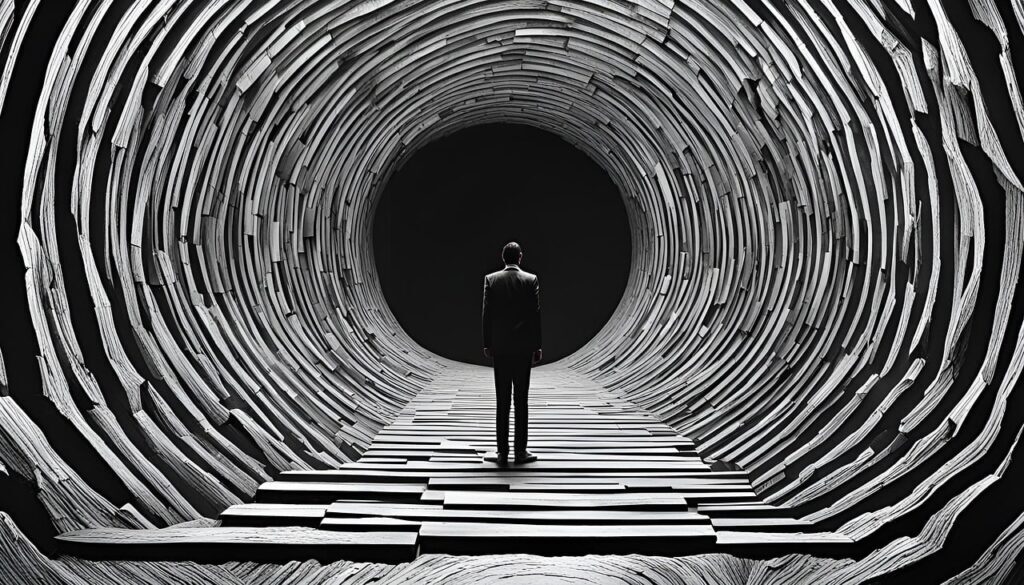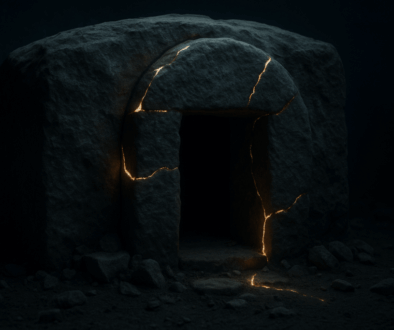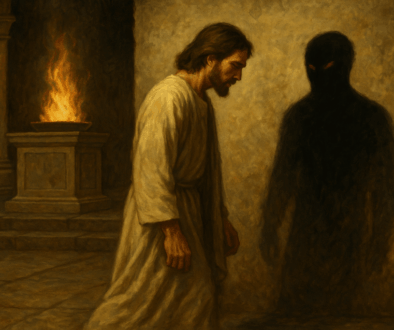Count the Cost: Jesus, Kierkegaard, Nietzsche, and the Abyss of Truth
“But don’t begin until you count the cost.” Luke 14:28a (NLT)
Sometimes, I wonder whether anyone truly shoulders the full weight of existence.
Perhaps we cope by turning away.
We ignore the abyss.
We dodge responsibility.
We silence the voice that echoes in our souls.
🔹 Christians often adopt an idealized, ready-made solution—rarely grappling with the radical cost of faith.
🔹 Atheists embrace intellectual theories—often without confronting the full implications of what they claim to believe.
🔹 Agnostics wrestle in the dark—but how many truly fight that battle to the bitter end?
And yet, if you dare to commit to any path, you must look into the abyss first.
If you’ve never felt the ground crack beneath your feet,
If you’ve never questioned everything you thought you knew,
If you’ve never come face-to-face with the raw terror of existence—
Have you really chosen anything at all?
Christianity: Have You Counted the Cost?
Christianity is not a sentimental choice.
It is not a warm feeling, a safe cultural identity, or an inspirational quote on a coffee mug.
To follow Jesus is to follow a man who shook the world—
and left behind words so devastating, so absolute,
that most who claim His name dare not take them seriously:
✔ “Take up your cross.” (Luke 9:23)
✔ “Sell all you have and give to the poor.” (Mark 10:21)
✔ “Love your enemies.” (Matthew 5:44)
✔ “Leave everything and follow me.” (Luke 14:33)
And where does that path lead?
To betrayal.
To mockery.
To torture.
To execution in the most excruciating way possible.
And that’s what you signed up for?
Really?
Then why do so many Christians cling to comfort, seek the path of least resistance,
and treat faith like a cozy shelter rather than an all-consuming fire?
Kierkegaard saw through the illusion of cheap faith:
🖋 “The Bible is very easy to understand. But we Christians are a bunch of scheming swindlers. We pretend to be unable to understand it because we know very well that the minute we understand, we are obliged to act accordingly.”
🖋 “To stand on the middle ground is to have already chosen against Christ.”
Jesus never softened His message. He made it clear:
📖 “Whoever does not carry their cross and follow me cannot be my disciple.” — Luke 14:27
📖 “No one who puts a hand to the plow and looks back is fit for the kingdom of God.” — Luke 9:62
📖 “Enter through the narrow gate… small is the gate and narrow the road that leads to life, and only a few find it.” — Matthew 7:13-14
Yet how many Christians live as if these verses are true?
Or are they just a comforting echo from another time,
a distant melody with no real cost?
Have you truly counted the cost?
Or have you made Jesus into a harmless mascot for a life of comfort?
Atheism: Have You Stared Into the Abyss?
But to be an atheist—to truly live as though no God, no cosmic order, no final justice exists—is hardly easier.
Countless professed atheists still behave as if meaning, morality, and human dignity are simply “givens.” As if these values just are.
Yet Nietzsche perceived the hollowness of this stance:
“God is dead. God remains dead. And we have killed him. Yet his shadow still looms.”
“They have got rid of the Christian God, and now feel obliged to cling all the more firmly to Christian morality.”
“Man would rather have the void as his purpose than be void of purpose.”
If God is truly dead, who then creates meaning?
If morality isn’t divinely anchored, why be moral at all?
If there’s no higher purpose, why press on?
Nietzsche offered no comforting resolutions:
- Some will spiral into nihilism, collapsing under the weight of a meaningless universe.
- Others, the Übermenschen, will rise above the void—creating their own values and forging meaning from the fires of sheer will.
But how many atheists actually seize this task?
How many dare to form their morality ex nihilo, without borrowing scraps from the old religious tapestry?
And how many still cling, half-consciously, to vestiges of a worldview they claim to have outgrown?
Atheism: Have You Stared Into the Abyss?
To be an atheist—to truly live as if there is no God, no cosmic order, no final justice—is hardly the easy way out.
Yet many who reject God continue to live as if meaning, morality, and human dignity are simply givens—as if they remain untouched, floating in the air, self-evident.
Nietzsche saw through this illusion long before most dared to:
🖋 “God is dead. God remains dead. And we have killed him. Yet his shadow still looms.”
🖋 “They have got rid of the Christian God, and now feel obliged to cling all the more firmly to Christian morality.”
🖋 “Man would rather have the void as his purpose than be void of purpose.”
If God is truly dead, then:
🔹 Who creates meaning?
🔹 If morality isn’t divinely anchored, why be moral at all?
🔹 If there’s no higher purpose, why press on?
Nietzsche offered no comforting resolutions:
✔ Some will collapse into nihilism, crushed under the weight of a meaningless universe.
✔ Others—the Übermenschen—will rise above the void, forging new values in the fire of sheer will.
But how many atheists actually take up this task?
How many dare to create morality ex nihilo, without unconsciously borrowing from the old religious tapestry?
And how many, despite their unbelief, still cling to echoes of a God they claim to have left behind?
Your Real Life Lies Beyond the Abyss
The abyss is unavoidable.
You can ignore it, pretend it’s not there, or live in distraction—but sooner or later, it demands to be faced.
Every path—whether faith or godlessness—leads to the edge of something vast, terrifying, and seemingly impossible to cross.
🖋 Nietzsche says: Leap into chaos, destroy illusion, and forge meaning from nothing. Become the Übermensch.
🖋 Kierkegaard says: Stand at the precipice, see the absurdity of existence, and take the leap of faith into the unknown. Become the Knight of Faith.
🖋 Jesus says: Step into the abyss. Confront the suffering, the doubt, the forsakenness. Die to yourself—and on the other side, be born again.
The truth is simple, but brutal: There is no resurrection without pain and death..
If you want the real life Jesus offers, you don’t just admire His sacrifice from afar—you enter into it.
If you want to be made new, you must first die.
To your ego. To your illusions. To your desperate attempts to control life.
Your real life lies on the other side of the abyss—but you have to go through it first.
The Real Question
There is a golden thread running through all of this.
No matter which path you walk, you must live your truth as courageously and authentically as you can—and you must embrace the abyss.
Because the abyss is unavoidable.
We cope by looking away.
We silence the voice inside.
We cling to half-measures, lukewarm commitments, and comfortable illusions.
But to truly live, you must face reality head-on.
• Christians talk about sacrifice but rarely count the cost.
• Atheists reject God but often inherit meaning they refuse to question.
• Agnostics wrestle with uncertainty, but how many dare to stay in the fight rather than drift into apathy?
No matter where you stand—the price of real belief is steep.
If you’ve never felt the ground crack beneath your feet,
If you’ve never questioned everything you thought you knew,
If you’ve never faced the raw terror of existence—
Have you really chosen anything at all?
🖋 Kierkegaard for the leap.
🖋 Nietzsche for the abyss.
🖋 Reality for everyone.
Count the cost—or the cost will count you.
Psycheverse: “I know your deeds, that you are neither cold nor hot. I wish you were either one or the other! So, because you are lukewarm—neither hot nor cold—I am about to spit you out of my mouth.”
— Revelation 3:15-16



